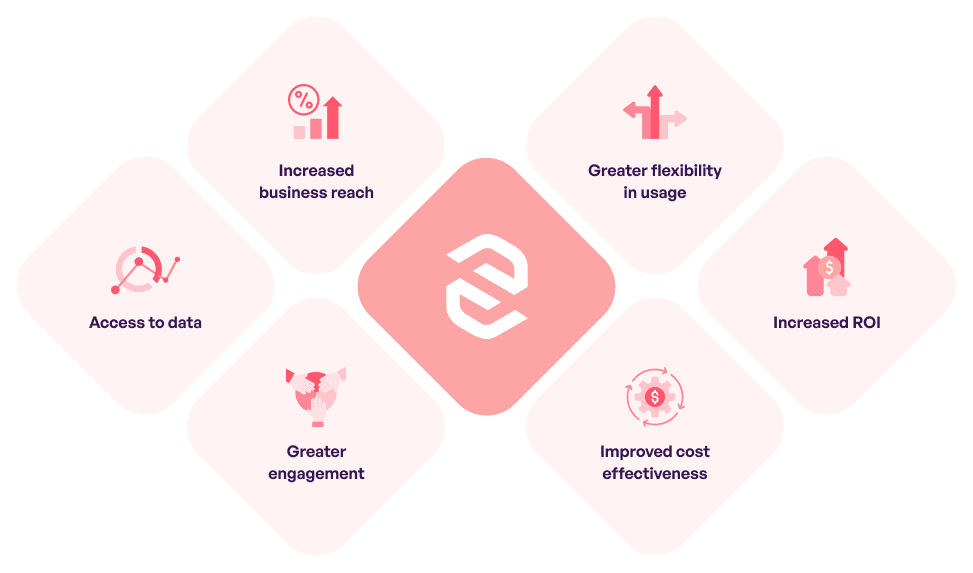There was a time when the term ‘products’ meant something tangible, but with the onset of digitalization the essence of products have now expanded into anything which can be used even virtually. This phenomenon which is known as ‘digital product’ sees its examples in ebooks, SaaS software, and courses, etc.
While the pandemic accelerated this transition from physical to digital, the demand for developing digital products has come on a track where it is on an all time high. Owing to this demand, businesses across sectors have started investing in digital product development.
There are still multiple businesses, however, that are on the fence when it comes to investing their limited resources – monetary and efforts – in advanced digital product development. The reasons for this apprehension can range from high competition, lack of a team to see the development process through or a mere lack of understanding of the digital space.
But if there is anything that the success of categories like eCommerce platforms, CRM software, and mobile applications have taught us, it is the fact that the benefits of designing digital products surpasses the weight of apprehensions.
In this article, we are going to look into the top advantages of product development highlighting why it has become critical for businesses to make the digital move.
Table of contents
The advantages of developing digital products
Developing digital products can be extremely rewarding for businesses. It doesn’t just provide a steady income stream but also helps companies create a lasting impact in their space.

Increased business reach
A well-executed digital product development process acts as an efficient way to reach a wider set of audience. The fact that the product is digital makes it easy to share with the world with only a link, social media post, or a direct message, not just locally but also globally.
By bringing your digital product in front of a global audience, you get to increase your reach and exposure while setting the track for increased sales.
Greater flexibility in usage
One of the biggest business benefits of digital products is that the users are able to use the product on the go by downloading or streaming the products’ offering on their devices. Moreover, since they do not require physical storage, users are able to buy, access the product without the hassles of physically carrying them around.
This flexibility and convenience that digital products offer extends to businesses as well since they are able to scale the products – update, upgrade, and modify features without physically creating a new version. An activity that comes with a much lesser overhead cost than upgrading a physical product.
Greater engagement
One of the crucial benefits of digital product development lies in the engagement opportunities. Because it can be used on the go without a dependency on physical storage along with the ease of sharing it comes with, makes digital products easily accessible.
This accessibility when managed strategically by adding engagement elements like polls, personalized offers, and high value etc. doesn’t just increase users in-product time but also improves brand loyalty.
Increased ROI
With digital product development, you can create something with much higher perceived value than a traditional physical product by adding more user-centered features, integrating new-gen technologies, or introducing new engagement models – all of this by spending only a small fraction of what you would have in a tangible product.
The fact that all of the upgrade activities will happen on the backend within your digital product development team, lowers the time it would take to get ROI on the amount you have invested in building and updating digital product development services.
Access to data
Unlike physical products, their digital counterparts give you access to users’ data around location, search patterns, buying habits, and interactions – information that can be used to offer personalized messaging and highlight areas of improvement.
Additionally, the insights help with analyzing the user trends and creating a system where new features can be added, personalized marketing initiatives can be planned, and more revenue streams can be built proactively before the users shift their interest to competitors.
Improved cost effectiveness
One of the biggest, critical benefits of digital product development can be seen in its cost effectiveness. As opposed to tangible products, digital products do not require an inventory to store them, which acts as a significant cost-saving factor. Moreover, the digital products can get modified and updated easily, thus lowering the need for expensive retooling and recalls.
For businesses with less budget and resources, building a digital product can be a cost-effective manner to bring their product to market.
Explore the benefit of
developing digital products
in your business

The advantages of developing digital products goes beyond just monetary benefits. It helps businesses with establishing their brand, creating a loyal user base, and expanding their scope of ROI generation. However, achieving these benefits would require companies to follow the digital product development trends, follow a well-planned strategy, and partner with a sound digital product development company.
But before all of this, they would need to consider some key factors to ensure that the development process is on the right path.
Key considerations for digital product development
Eventhough the digital product development process is fairly straightforward, ensuring that the product is aligned with the expected benefit of developing digital products, would require businesses to do some homework in terms of creating a high-level strategy.
Know the problem you are solving – In order to build and launch a digital product, you will first need to know what you are building and why. Getting an answer to this would call for detailed research into the market, competition, and the users.
Proof of problem – Once you have shortlisted a few digital product ideas, the next step will be to establish the proof of concept. The right way to approach this will be to create a prototype and have interviews with the real users to understand their opinion and refine the product based on the feedback.
Build an MVP – After you have refined the product based on users feedback, the next step would be the creation of MVP that you can then push in the market for further feedback rounds and official product launch.
Measure success – It is important to know what success means for your business. Is it the number of downloads, NPS score, CLV, or customer retention? You should have the answer to this before you make your digital product live in the market.
At Neojn, we keep these elements our top considerations when we work on your digital product development project. When you partner with us, you can be rest assured that you will get an end-to-end design and development partnership that will ensure you are prepared for success from day one of your product’s conceptualization.
Recently, we helped a Fintech firm build a solution, DoughFi, to enable physical goods retailers and individuals to transact virtually – with all the benefits of cash transactions but without the institutional oversight of a cash transaction. This is just one example of how we help businesses – startups and enterprises – digitalize their offerings with our full-stack development expertise. Get in touch to experience the perks of partnering with us.
Digital product development journey can be complex, however we can make the process easier with our dedicated expertise that ranges from idea validation, design, to development, and scaling of the product. Reach out to our team of product development experts, today.
FAQs
Q. What is the purpose of digital products?
A. Digital products are those intangible assets which can be used, sold, and shared, just like their physical counterparts. The end goals of a digital product can be improved ROI, mass exposure, and better brand loyalty.
Q. What is an example of a digital product?
A. Digital product development examples can be seen in solutions like eBooks, online music, SaaS software, ERP system, etc. These products are intangible items which get delivered and are used over the internet.
Q. Why do companies create digital products?
A. There are a number of benefits that come attached with creating digital products – Increased business reach, greater flexibility in usage, higher engagement, increased ROI, access to data, and improved cost effectiveness.
